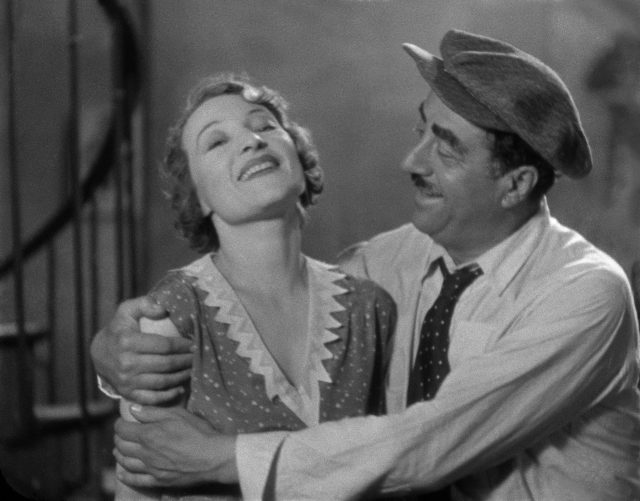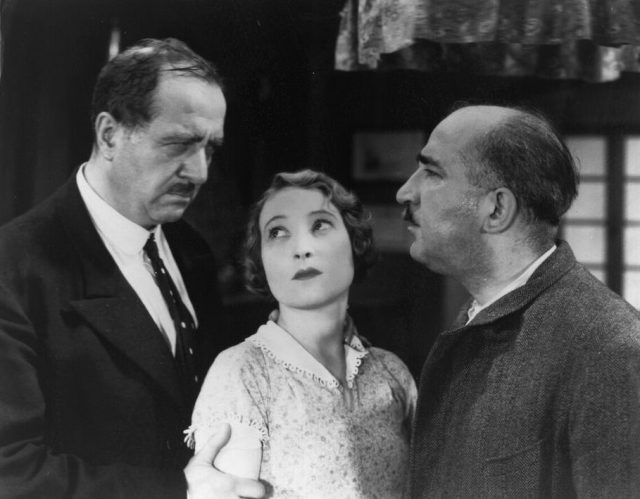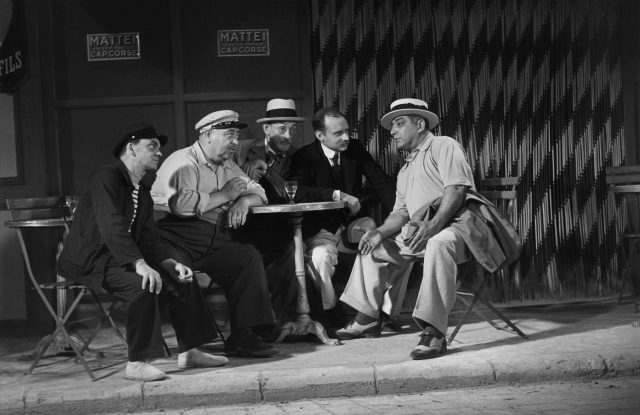
Fanny (Orane Demazis) and César (Raimu) share a moment of happiness in MARIUS (courtesy Janus Films)
MARIUS (Alexander Korda, 1931)
FANNY (Marc Allégret, 1932)
CÉSAR (Marcel Pagnol, 1936)
Film Forum
209 West Houston St.
January 4-12
212-727-8110
filmforum.org
 One of the great trilogies in the history of cinema, Marcel Pagnol’s Marseille Trilogy will be playing at Film Forum January 4-12 in a new 4K restoration, including marathon viewings of Marius, Fanny, and César on January 7, 8, 11, and 12. French novelist, playwright, screenwriter, and director Pagnol penned all three scripts, the first two based on his stage plays, as he investigated love, honor, betrayal, friendship, religion, scandal, and social ritual among the petit bourgeois, the lower-middle-class citizens of the port town of Marseille. Shot on location, the three films, also known as the Fanny Trilogy, center on the big, boisterous César (Raimu in a marvelous comedic tour de force), who runs a local bar with his ne’er-do-well son, Marius (Pierre Fresnay). Marius is childhood friends with the sweet Fanny (Orane Demazis), who declares her love for him only after the rich, successful older merchant Honoré Panisse (Fernand Charpin) requests her hand in marriage. As Fanny’s mother, Honorine (Alida Rouffe), and aunt, Claudine (Milly Mathis), contemplate the potential match, Fanny tries to convince Marius to marry her instead, but he is hesitant, drawn instead to the sea despite his love for Fanny. Directed by Alexander Korda (Rembrandt, The Private Life of Henry VIII), Marius is a rollicking good romance with a surprising dash of naughtiness and featuring an outstanding group of minor characters, including Paul Dullac as Félix Escartefigue, Alexandre Mihalesco as Piquoiseau, Robert Vattier as Albert Brun, and Edouard Delmont as Dr. Félicien Venelle. The camaraderie among the characters is infectious — many of the actors previously played the same roles onstage — with César leading the way, a big, boisterous man whose bravura mix of insults and praise is as potent as the drinks in his bar.
One of the great trilogies in the history of cinema, Marcel Pagnol’s Marseille Trilogy will be playing at Film Forum January 4-12 in a new 4K restoration, including marathon viewings of Marius, Fanny, and César on January 7, 8, 11, and 12. French novelist, playwright, screenwriter, and director Pagnol penned all three scripts, the first two based on his stage plays, as he investigated love, honor, betrayal, friendship, religion, scandal, and social ritual among the petit bourgeois, the lower-middle-class citizens of the port town of Marseille. Shot on location, the three films, also known as the Fanny Trilogy, center on the big, boisterous César (Raimu in a marvelous comedic tour de force), who runs a local bar with his ne’er-do-well son, Marius (Pierre Fresnay). Marius is childhood friends with the sweet Fanny (Orane Demazis), who declares her love for him only after the rich, successful older merchant Honoré Panisse (Fernand Charpin) requests her hand in marriage. As Fanny’s mother, Honorine (Alida Rouffe), and aunt, Claudine (Milly Mathis), contemplate the potential match, Fanny tries to convince Marius to marry her instead, but he is hesitant, drawn instead to the sea despite his love for Fanny. Directed by Alexander Korda (Rembrandt, The Private Life of Henry VIII), Marius is a rollicking good romance with a surprising dash of naughtiness and featuring an outstanding group of minor characters, including Paul Dullac as Félix Escartefigue, Alexandre Mihalesco as Piquoiseau, Robert Vattier as Albert Brun, and Edouard Delmont as Dr. Félicien Venelle. The camaraderie among the characters is infectious — many of the actors previously played the same roles onstage — with César leading the way, a big, boisterous man whose bravura mix of insults and praise is as potent as the drinks in his bar.

Things get serious for César (Raimu), Fanny (Orane Demazis), and Honoré Panisse (Fernand Charpin) in FANNY (courtesy Janus Films)
It’s a great start to the trilogy, which continues with 1932’s Fanny, directed by Marc Allégret (Zouzou, Lady Chatterley’s Lover). If you don’t want to know what happens next, don’t read on, but make sure to see all three films, as each one is a gem. Marius has headed out to sea for five years, leaving behind a pregnant Fanny, who is shocked but delighted when Panisse agrees to marry her anyway, raising the child as if he were his own. César is overjoyed to have a grandson, who is named after him, Césariot, even though all have decided to keep everything secret in order to avoid scandal. But when Marius shows up during a brief layover, he is curious about the baby and is determined to find out the truth. Most of the cast returns for Fanny, except Auguste Mouries now plays Escartefigue, along with such new characters as Mangiapan (Marcel Maupi) and the local priest, Elzéar Bonnegrâce (Louis Boulle).

Marcel Pagnol’s Marseille Trilogy concludes with CÉSAR (courtesy Janus Films)
The conclusion, directed and written for the screen by Pagnol, César was made four years later but takes place twenty years in the future. As Panisse lies dying in bed, Father Elzear (Thommeray) presses him to confess his sins and, most important, reveal the truth about his son’s birth to the boy himself, Césariot (André Fouche). Meanwhile, Marius toils away in a garage in another town, having been out of everyone’s life for fifteen years. (If the plot of the entire trilogy sounds very familiar, then you must have seen Jacques Demy’s The Umbrellas of Cherbourg.) The setup makes for some hysterical battles between the priest, the doctor, and Panisse, as organized religion takes some heavy hits. Pagnol also explores different reactions to death, sharing clever insight as well as sharp humor. The trilogy, which was restored by Compagnie Méditerranéenne de Film — MPC and the Cinémathèque Française and has been remade (in part or whole) by such directors as James Whale, Joshua Logan, and Daniel Auteuil, is thoroughly charming, a realistic depiction of life with all its grace and indignities. It won’t take long until you feel like you’re a member of this dysfunctional but enchanting family.